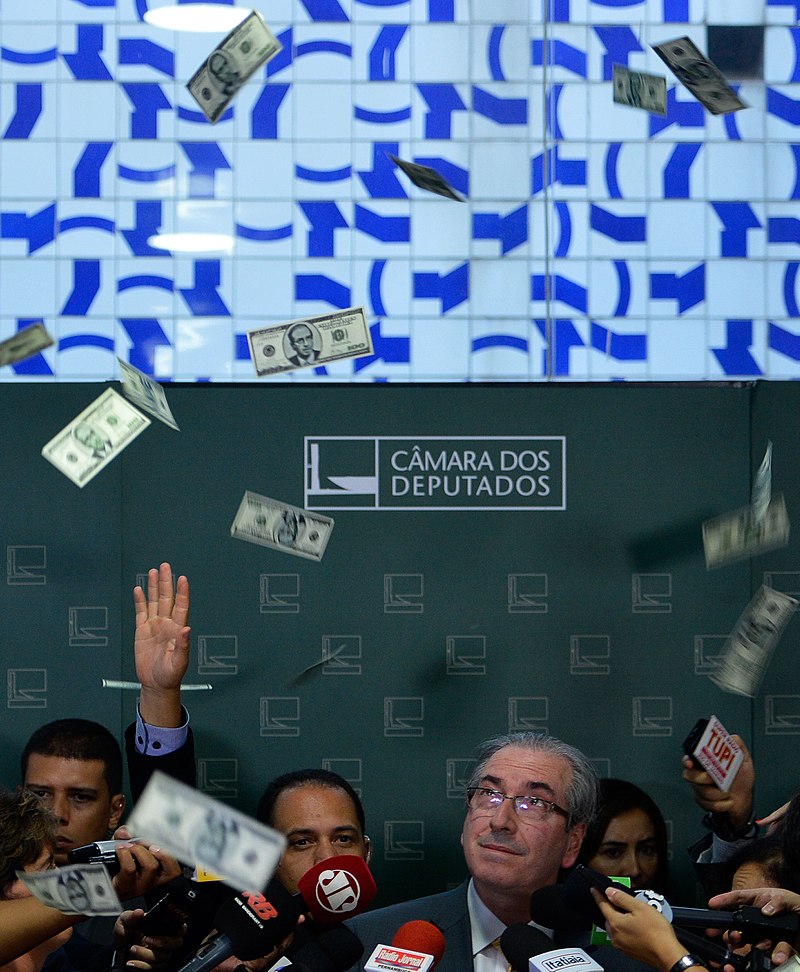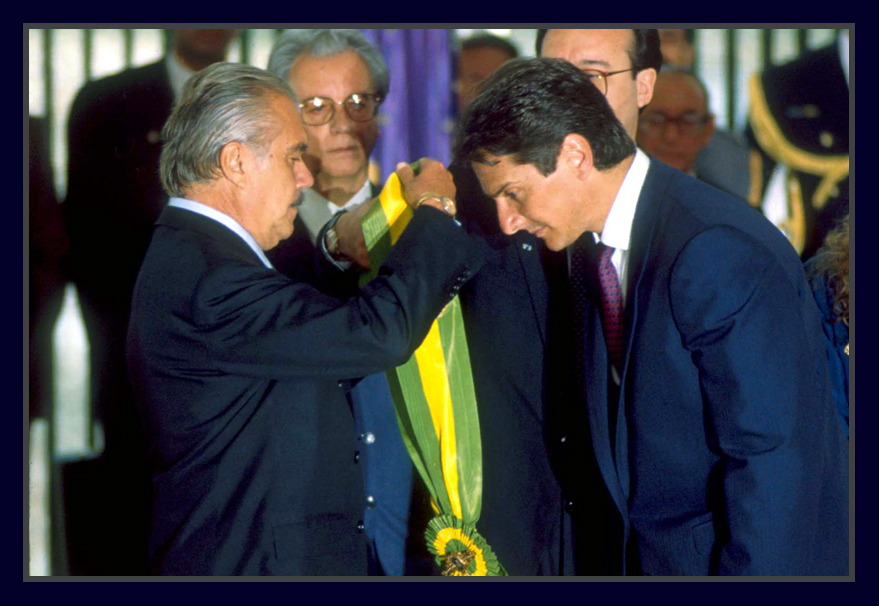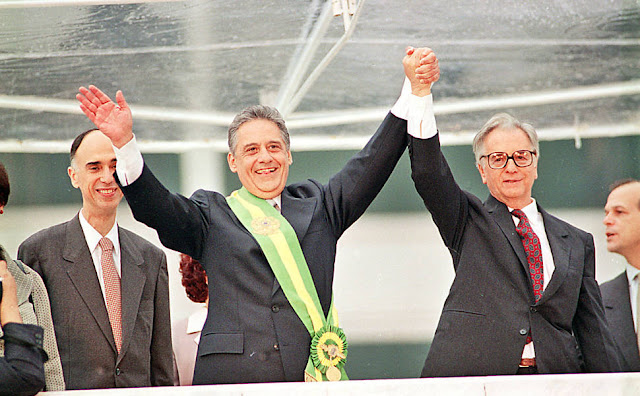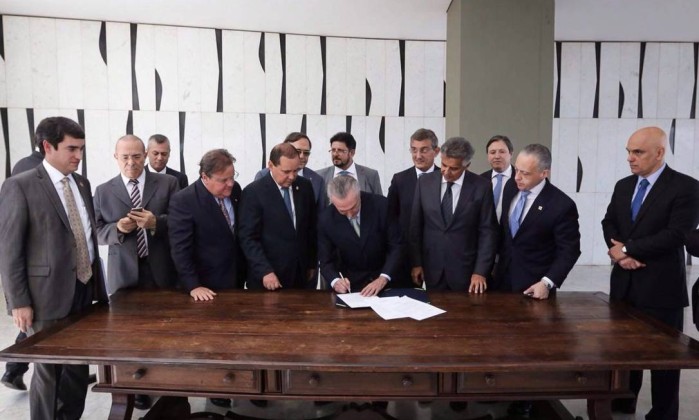
Eduardo Cunha, at the time president of the Chamber of Deputies, receiving bath of false dollars containing his face in form of protest against the corruption
Corruption in Brazil directly affects the well-being of citizens by reducing public investments in health, education, infrastructure, security, housing, among other essential rights to life, and damages the Constitution by widening social exclusion and economic inequality . Generally, corruption occurs through resources from the public budgets of the Union, the States and Municipalities for health, education, social security and infrastructure and social programs, which are diverted to finance electoral campaigns, corrupt public officials, or even for personal bank accounts abroad.
Studies of the Getúlio Vargas Foundation (FGV) of 2009 estimate that the Brazilian economy loses from one to four per cent of Gross Domestic Product (GDP) every year, equivalent to a value of more than 30 billion reais. The following year, a study by the Federation of Industries of the State of São Paulo (Fiesp) pointed out that the annual cost of corruption in the country is 1.38 percent to 2.3 percent of GDP. In 2013, a study by the National Confederation of Industry (CNI) showed that each real one diverted by corruption represents a damage to the economy and society of three reais.
The Federal Police considers Operation Lava Jato the largest corruption investigation in the country's history, and the United States Department of Justice considers the Odebrecht Group's corruption scheme, investigated by Lava Jato, as the highest tip payment in world history. Lava Jato revealed a picture of systemic corruption in Brazil, showing that corruption became part of the system itself. In 2015, an opinion poll conducted by the Datafolha Institute, indicated that corruption is the biggest problem in Brazil. 2017, the Directorate for Combating Organized Crime (DICOR / PF) totaled that, as of 2013, losses with various deviations reached close to 123 billion Reais.
History of corruption in Brazil
As Fernando Filgueiras teaches: tolerance for corruption is not a departure from the Brazilian's character, a propensity and a cult of immorality, not even a situation of cordiality, but a practical disposition born of a culture in which preferences are circumscribed to a context of needs, representing a strategy of survival that occurs by the material question.
Nepotism had already landed in Brazil aboard the first caravel, and the letter to King D. Manuel written by Pero Vaz de Caminha, in which he asked the king to send "from the island of São Tomé to Jorge of Osorio, my son-in-law. " To occupy and manage the new territory, a task complicated enough by the geographic distance and precariousness of communications, the Portuguese crown had to offer incentives and relaxed in the vigilance of its representatives. This generated an environment so favorable to the practice of corruption that already in the seventeenth century, Father Antonio Vieira denounced it through the Sermon of the Good Thief, where he boldly exposes the desmandos practiced by settlers and administrators in Brazil:
The thief who steals to eat will not, nor will it lead to hell; those who not only go, but lead, of which I deal, are other thieves, of greater caliber and higher sphere. ... The thieves who more properly and worthily deserve this title are those to whom the kings entrust the armies and legions, or the government of the provinces, or the administration of the cities, which already with strength, already rob, and spoil the people. The other thieves steal a man: they steal cities and kingdoms; the others steal under their risk: these without fear or danger; the others, if they steal, are hanged: these steal and hang.
"
There have also been reports of corruption in the highest spheres of power since the early nineteenth century. At that time, the following verses ran the streets of the national capital:
Little thieves are thieves
Who robs a lot is Baron
Who else steals and hides
Passes from baron to viscount

Military regime
Imbued with a moralizing spirit, early in his administration Marshal Castelo Branco promised that he would do extensive research and dissemination on the corruption in force in the deposed government of João Goulart. One of the main instruments created for this purpose was the General Investigations Commission (CGI), the body responsible for conducting Military Police Inquiries. The misconduct would be gathered in a "white book of corruption", which would be widely publicized. Such a book, however, was never produced, much less published. In 1978, the CGI was extinguished by General-President Geisel.

Sarney Government
Accusations of endemic corruption in all spheres of government have been noted, with President Jose Sarney himself denounced, although the accusations have not been taken forward by the National Congress. It was between 1987 and 1989, which broke out the political crisis, allied to the economic crisis. Suspected overbilling and irregularities in public bidding, such as the North-South Railroad bid, were cited.
The denunciations still affirmed that Jose Sarney practiced the nepotism, that is, favored friends and acquaintances with concessions in radios and TVs. The dissatisfaction in a wing of the Party of the Brazilian Democratic Movement (PMDB), current MDB, caused the Brazilian Social Democracy Party (PSDB) to be founded. The height of the crisis came during the National Constituent Assembly, where party members voted for Sarney's four-year term despite the fact that the five-year stance prevailed, dominated by a majority of the PMDB party and conservative politicians.
In 1988, in Congress, an ICC was set up to investigate corruption allegations in his government, and several impeachment applications were filed by the House presidency. The CPI of corruption pointed to the former president as one of those responsible for the scheme, for having released money from funds controlled by the Presidency to municipalities, without criteria. As the money ended, Sarney used the so-called contingency reserve and had the help of Planning Minister Anibal Teixeira.
Collor Government
In the last two decades of the twentieth century, particularly after the end of the military regime, notorious cases of corruption have gained prominence in the media, including the removal of President Fernando Collor de Mello - the first Latin American president to suffer impeachment.
Early in the second half of the first year of Fernando Collor's administration, the first allegations of corruption in the Executive appeared. The then president of Petrobras, Luis Octavio da Motta Veiga, resigned, claiming he was being pressured by former campaign treasurer Collor Paulo César Farias and the president's brother-in-law, Ambassador Marcos Coimbra, to grant loans, without interest, to VASP, recently privatized by the government. The year 1991 began with new accusations of corruption, this time reaching first lady, Rosane Collor, in the presidency of the Brazilian Legion of Assistance (LBA). And they were accumulating until, in May of the following year, Pedro Collor, brother of the president, gave an interview to Veja, accusing PC Farias of illicit enrichment and of being iron head of the president of the Republic in its businesses.

Since 1993, the extension of the denunciations has shaken belief in the institutions and future of the country and has led to the establishment of a Parliamentary Inquiry Commission (CPI), which became known as the CPI of the Budget, chaired by then-Senator Jarbas Passarinho. as rapporteur the governor of Pernambuco at the time, Roberto Magalhães. In 2014, however, former President Collor was cleared by the Federal Supreme Court of the accusations of corruption that were imputed to him and which resulted in his impeachment.
Government Itamar Franco
The new government assumed by Vice President Itamar Franco was initially supported by all political forces in Congress, except the Liberal Front Party (PFL), which also began to suffer denunciations of involvement of ministers in corruption. Several of his ministers, including Henrique Hargreaves and Alexandre Costa, as well as Finance Minister Eliseu Resende, were removed from the government. With the Real Plan, Itamar elected Fernando Henrique and, like Sarney, did not leave the political scene.

Government FHC
The Fernando Henrique Cardoso government guaranteed the blessings of the Real Plan, but its government was also shaken by a series of accusations of corruption. The problems began with the interventions in the National and Economic banks, and the consequent creation of the Program to Stimulate the Restructuring and Strengthening of the National Financial System (Proer),
But the biggest problems came with the privatization program. One of the accused was former Banco do Brasil director Ricardo Sérgio de Oliveira, a former campaign box. He would have acted to secure the entry of Previ, BB's pension fund, into the consortium formed by Telecom Italia and Opportunity bank, Daniel Dantas. Ricardo Sérgio granted a very high letter of guarantee to the consortium. In this process, telephone wiretaps aggravated the accusations and shook the Toucan government. Conversations between the then Minister of Communications, Luiz Carlos Mendonça de Barros and BNDES President André Lara Resende, caught the operation set up to benefit the Opportunity consortium.
But the government's biggest accusation was to buy votes to pass a constitutional amendment that allowed re-election to executive positions. In May 1997 telephone clusters published by Folha de S.Paulo revealed conversations between the then deputy Ronivon Santiago and another voice identified in the newspaper as Lord X. In the conversations, Ronivon Santiago states that he and four other deputies received 200 thousand reais to vote in favor of the reelection, paid by the then governor of Acre, Orleir Cameli.

Government Lula
The most notorious corruption scandal in the Lula administration was the Mensalão, and it was denounced in 2005. It was a scheme to buy votes from the Partido dos Trabalhadores (Workers' Party), denounced by the deputy Roberto Jefferson, who later made a commendation. The scandal led to the annulment of Roberto Jefferson and José Dirceu, who was a cabinet minister in Lula's administration and was considered by the Supreme Court as one of the commanders of the scheme. The PT bought votes from congressional parliamentarians, giving them an allowance, in exchange for support to approve reforms the party wanted to pass. It turned out, for example, that in 2003, Lula's proposed pension reform passed in Congress because of the votes that were purchased.
Before the monthly payment, in 2004, the Lula government faced political crises, in what was called the Bingos scandal. Nele Waldomiro Diniz, advisor to José Dirceu appears in the release of a tape recorded by the businessman and bicheiro Carlos Augusto Ramos, Carlinhos Cachoeira, extorting the money to raise funds for the PT and PSB election campaign in Rio de Janeiro.

In exchange Waldomiro promised to help Augusto Ramos in a public competition. The Federal Public Prosecutor filed a complaint received by the Federal Court for criminal conduct in negotiations for the renewal of the contract between the Federal Savings Bank (Caixa Econômica Federal) in 2003. An amount of R $ 6 million was initially required by a consulting firm, which was closed at R $ 6 million.
In 2006, the Dossier Scandal or Alleged Scandals came to light, as did the repercussion of the arrest on September 15, 2006 of some members of the Workers' Party (PT) accused of buying a false dossier , by Luiz Antônio Trevisan Vedoin, with funds of unknown origin. The dossier would accuse the PSDB candidate José Serra of the São Paulo state government of having links to the leech scandal. The supposed plan would be to harm Serra in the dispute to the government of São Paulo, in which its main opponent in the dispute was the senator Aloizio Mercadante. Supposedly, not only was Serra targeted, there would also be charges against presidential candidate Geraldo Alckmin.
The investigations and testimony of the suspects demonstrated that the content of the dossier against PSDB politicians was false. The expression "aloprados" was used by Luiz Inácio Lula da Silva to designate those accused of buying the dossier.
In 2016, former President Lula (PT) became a defendant for passive corruption and money laundering, culminating in his conviction and arrest for 12 years and 1 month in April 2018.

Government Dilma Rousseff
Operation Lava Jato is an operation that began in March 2014, during the Dilma Rousseff administration, by the Federal Police, which unveiled a corruption scheme within Petrobras and other state-owned companies to favor large cartel contractors. in turn made payments of bribes to politicians, who defended the interests of these constructors involved in the scheme. It was considered by the PF the largest corruption scheme in the history of the country. The payment of bribes exceeds ten billion reais, and is considered by the United States Department of Justice the largest case of international bribery. Throughout the operation, more than a thousand court orders were authorized, more than one hundred people were arrested, [38] and politicians, such as André Vargas and Eduardo Cunha were jailed in the Brazilian Chamber of Deputies, and arrested. The operation was triggered during the Dilma government, but the crimes began in 2004 under the Lula government and lasted until 2015, during the Dilma government. The main parties involved are PP, PT and PMDB, however, it involves other politicians from different parties.

In 2014, members of the Dilma government and the president herself were investigated for the purchase of the Refinery Pasadena Refinery System Inc, which resulted in a $ 790 million loss to Petrobras. In December 2014, the General Comptroller of the Union (CGU), through Minister Jorge Hage, appointed 22 persons responsible for the business, among them José Sérgio Gabrielli and former directors Nestor Cerveró, Paulo Roberto Costa, Renato Duque and Jorge Zelada, and exempted President Dilma Rousseff, who chaired Petrobras' board of directors, and Graça Foster, from any responsibility. But the CGU is just a subordinate body to President Dilma Rousseff and does not act independently.
In 2016, after the STF released the testimonies of Nestor Cerveró's award-winning demarcation, it was found that, through the testimony of the informant, the outgoing president, Dilma Rousseff, knew about PT's policy payments to the refinery.
In 2017, former President Dilma Rousseff (PT) had her assets blocked by the Union Court of Audit (TCU) for losses to Petrobras, and another 5 former members of the state's board of directors were also hit.

Government Michel Temer
The corruption scandals established by Operation Lava Jet continued to generate polemics and instability in the government after Dilma Rousseff's impeachment.
On May 17, owners of the JBS refrigerator said in a statement that they had engraved President Michel Temer authorizing the purchase of the silence of the detained deputy and former president of the Chamber of Deputies, Eduardo Cunha, when he was already in jail for the Lava Jato. Joesley Batista, a JBS owner, would have delivered a tape made in March 2017 in which Temer tells Congressman Rodrigo Rocha Loures to settle matters for J & F, a holding company that controls JBS. Subsequently, Rocha Lourdes was filmed receiving a suitcase with five hundred thousand reais, sent by Joesley. In another recording, also in March, the businessman would have told Temer that he was paying "an allowance" to Cunha and to the operator Lúcio Funaro, so that they would remain silent in the prison. This scandal generated several popular protests and caused that if it were questioned if Temer could continue in the position of president

Nenhum comentário:
Postar um comentário